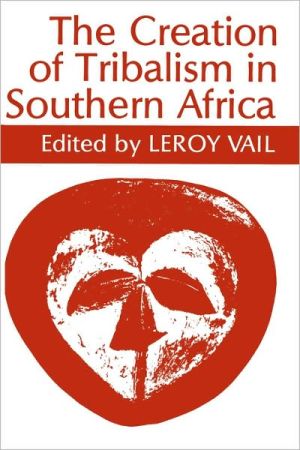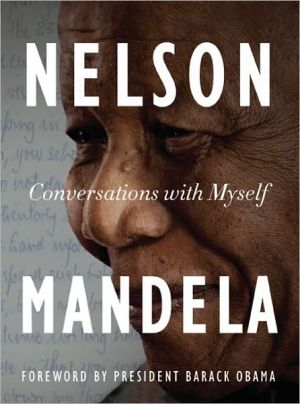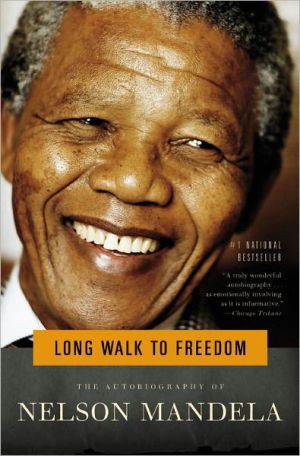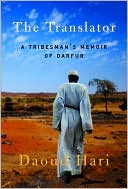The Creation of Tribalism in Southern Africa
Despite a quarter century of "nation building," most African states are still driven by ethnic particularism‹commonly known as "tribalism." The stubborn persistence of tribal ideologies despite the profound changes associated with modernization has puzzled scholars and African leaders alike. The bloody hostilities between the tribally-oriented Zulu Inkhata movement and supporters of the African National Congress are but the most recent example of tribalism's tenacity. The studies in this...
Search in google:
A collection of studies by key academics on ethnic identity in Africa.
The Creation of Tribalism in Southern Africa\ \ University of California Press\ Copyright © 1989 Leroy Vail\ All right reserved. \ ISBN: 0-520-06284-1 \ \ \ \ Introduction\ Ethnicity in Southern African History Leroy Vail \ Out of the crooked timber of humanity no straight thing can ever be made. Immanuel Kant\ Interpretations\ African political leaders, experiencing it as destructive to their ideals of national unity, denounce it passionately. Commentators on the Left, recognizing it as a block to the growth of appropriate class awareness, inveigh against it as a case of 'false consciousness'. Apologists for South African apartheid, welcoming it as an ally of continued white dominance, encourage it. Development theorists, perceiving it as a check to economic growth, deplore it. Journalists, judging it an adequate explanation for a myriad of otherwise puzzling events, deploy it mercilessly. Political scientists, intrigued by its continuing power, probe at it endlessly. If one disapproves of the phenomenon, 'it' is 'tribalism'; if one is less judgmental, 'it' is 'ethnicity'.\ Ethnicity's emergence as a central concern for a wide range of students of African affairs is relatively recent, and its forceful intrusion upon the dominant nationalist paradigm of the 1950s and early 1960s was both unexpected and unwelcome. At that time, it was accepted that Africans were organized naturally into 'tribes', but, as nationalist movements in Africa were then apparently enjoying great success, most observers believed that parochial ethnic loyalties were merely cultural ghosts lingering on into the present, weakened anomalies from a fast receding past. As such, they were destined to disappear in the face of the social, economic and political changes that were everywhere at work. People from all sectors of the political spectrum believed in this vision. For those on the Right and in the Centre, 'modernization' would do the job. Greater access to education, improved communications, and the shifting of people from the slumbering 'traditional' rural sector of the economy to the vibrant 'modern' industrial sector by the beneficent forces of economic growth guaranteed that ethnic loyalties would fade away. In their place would grow a new, nationoriented consciousness which would underpin progressive 'nation-building', especially if the new nation states could make good their promises of a better life for all their citizens. Africa would be a continent of new Switzerlands in which cultural divisions would be of little political importance.\ For those on the Left, too, 'modernization' was the key, although it was viewed from a somewhat different perspective. The break-down of 'traditional' societies by the forces of new, state-sponsored welfare socialism, with its expanded facilities in public education, medicine and agricultural programmes, would allow newly independent African states to 'skip a stage' in the evolution of their societies towards socialism and to enter directly into that blessed condition. In effect, socialism would then provide the material base for a pan-ethnic class consciousness that would transcend, if not negate, cultural differences. Africa would be a continent of new Yugoslavias.\ The general paradigm of 'modernization', then, appealed to almost every political viewpoint. For almost every observer nationalism seemed progressive and laudable, while ethnicity-or, as it was usually termed, 'tribalism'-was retrogressive and divisive.\ Ethnicity, however, failed to cooperate with its many would-be pall-bearers. It soon became clear that African nationalist movements, ideologically shaped by the basically negative sentiments of anti-colonialism and with little substantive philosophical content relevant to the day-to-day life of ordinary Africans living in post-colonial states, were simply unable to provide them with compelling intellectual, social, and political visions. Once the attainment of independence had made most of its anti-colonial message irrelevant, nationalist 'thought' was transformed into a gloss for the manipulation of the institutions of the new nation-states on behalf of the interests of the ruling political parties in a succession of one party states. Much state activity was devoted to the pursuit of variously defined forms of 'economic development', but such development proved elusive and the much-desired economic Fruits of Independence generally failed to ripen. That growth which did occur, moreover, was usually to the benefit of the dominant political classes and possessed little popular appeal.\ As a result of this quick reining in of nationalism's popular thrust within the bureaucratic structures of essentially artificial post-colonial states, ethnic or regional movements rooted in the colonial era had fresh life breathed into them and came to be seen as attractive alternatives to the dominant political parties with their demands for uncomplaining obedience from the governed. In effect, the revitalization of 'tribalism' was structured into the one-party system by the very fact of that system's existence. Ethnicity became the home of the opposition in states where class consciousness was largely undeveloped. Ethnic particularism has consequently continued to bedevil efforts to 'build nations' to the specifications of the ruling party for the past two decades or more. This hard political fact has called forth ever more systematic repression of dissent by those in control of the state, thus, in effect, strengthening the appeal of the ethnic alternative. Ethnicity's future, even in countries such as South Africa, where industrialization has proceeded further than anywhere else on the continent, seems secure because it is likely to provide an important focal point for whatever opposition to the dominant political classes that might exist.\ With its power to divide people politically, then, and with its sturdy resistance to erosion by the ideological forces of national or class consciousness, ethnicity came to demand close-albeit it often very grudging-attention after decades of neglect. Its source and appeal needed reasonable explanations, and interpretations of it have ranged widely, reflecting its multidimensional nature.\ The most prominent explanation-if only because of its widespread use-is the one that, despite the great frequency with which one encounters it in media coverage of Africa, is plainly the least satisfactory. In effect, this interpretation is a restatement of the old assumption that Africans are by nature 'tribal' people and that 'tribalism' is little more than an irrelevant anachronism, an atavistic residue deriving from the distant past of rural Africa. It should have evaporated with the passage of time, but, inexplicably, something went wrong, and it continues to refuse to obey the laws of social and political change. It thus remains able to motivate Africans to frequent actions of conflict and violence. Ethnic consciousness is, in this view, a form of collective irrationality.\ The problems with this interpretation are clear. First, it is always dangerous to assume that people consistently act out of mass irrationality. People tend to act rationally, and there is no reason on the face of it to accept that Africans are exceptions. Second, this argument is, in effect, also a tautology with no analytical power, arguing as it does that Africans act 'tribalistically' because they are naturally 'tribal'. Third, and most tellingly, empirical evidence shows clearly that ethnic consciousness is very much a new phenomenon, an ideological construct, usually of the twentieth century, and not an anachronistic cultural artifact from the past. As an offspring of the changes associated with so-called 'modernization', therefore, it is unlikely to be destroyed by the continuation of these same processes. For all these reasons, then, this interpretation must be discarded.\ Other, more scholarly interpretations have been suggested to explain the origin and persistence of ethnicity in Africa. All these interpretations have two things in common. First, they derive mainly from the work of anthropologists, sociologists and, especially, political scientists, observers who have been primarily concerned with the situation in Africa at the time they actually studied it. This has meant that their interpretations have usually been concerned with ethnicity's role at the moment of observation and its potential for the future. As such, they usually give only brief attention to its history, presenting whatever history that might be uncovered as mere 'background' to ethnicity's contemporary role.\ Second, all these interpretations are also marked by the fact that they have evolved out of the nationalist paradigm dominant from the 1950s into the 1970s. They implicitly accept a basically evolutionary view of human history. In this view, the future ought to be better than the past, and 'better' has been identified with improvements assumed to flow from an increase in political scale and the growth of national unity-in short, from 'nation-building'. As a consequence, most such analyses of ethnicity are concerned with the way it has traduced the promise of modernizing nationalism and are thus predisposed to negative judgments. Their emphasis, therefore, has been on ethnicity's role as a disrupter of the promising trends of secular nationalism that seemed to characterize African politics in the late 1950s and early 1960s and to promise a rosy future.\ The intellectual range of these interpretations of ethnicity has been wide. One viewpoint encountered frequently-especially within Africa itself-is that ethnicity is primarily the result of a history of 'divide-and-rule' tactics which colonial governments cannily employed. European anthropologists connived at such policies by specifying 'tribes' culturally within the context of a uniquely colonial sociology, thereby giving the 'tribe' a real, but specious, identity. The element of truth in this explanation has made it superficially attractive, especially as the South African government today actively uses both approaches in its Bantustan policies and in its stress on the uniqueness of 'tribal' culture, patent efforts to promote political divisions among the country's African population.\ Yet whatever its merits, it is an explanation clearly insufficient to explain the persistence of ethnic consciousness. This is so for several reasons. First, it fails to explain why, in a particular territory throughout which the colonial state employed roughly the same divide-and-rule policies, ethnic consciousness developed unevenly, strong among certain peoples but not among others, a situation common throughout Africa. Second, it tends to depict Africans as little more than either collaborating dupes or naive and gullible people, beguiled by clever colonial administrators and untrustworthy anthropologists, a situation which empirical evidence fails to corroborate. Finally, it does not explain how, three decades after the departure of the colonialists, 'tribalism', or its close kin, 'regionalism', lives on as strongly as ever in independent African states, the governments of which have been actively trying to suppress it, and why in some places it is growing up for the first time. The clever blandishments of subtle European administrators are clearly insufficient to explain either the origins of ethnic consciousness or its continuing appeal today.\ A second interpretation, especially prominent in the 1950s and early 1960s, arose from the study of urban sociology, especially in the mining areas of Central Africa. Intellectually, it was linked to the Dual Economy model of 'modernization' theory, and it located its interpretation of the development of new ethnic consciousness in the experiences of rural people in industrial workplaces. As members of various cultural groups left their isolated rural areas and interacted with each other in industrial or urban locales, they formed stereotypes of themselves and others, and these stereotypes effectively highlighted and strengthened culturally defined distinctions amongst peoples. The tendency of employers to prefer certain ethnic groups for certain types of work and their conscious manipulation of ethnic differences to keep the workforce disunited resulted in competition between ethnic groups being built into the hierarchically structured workforce. In this view, ethnicity was a recent phenomenon of the modern urban workplace in which boundaries and distinctions between people had been built up. It was not a phenomenon of the rural areas, where people were assumed to live in accordance with prescriptive patterns derived from a 'traditional' past and where they were largely isolated from peoples of differing cultures. As such, some scholars, as well as most African politicians of the time, assumed that the but recently formed ethnic identities were still malleable and that they would prove susceptible to an easy transformation into a national identity through processes of political mobilization associated with 'nation-building', especially if the labour unions representing such workers could be coopted into the national political establishment.\ This interpretation is certainly valuable for its underscoring of the important point that ethnic stereotypes were indeed largely produced in work situations and in urban settings. Yet it too is unable to serve as a general explanation of ethnicity's origin or, especially, its persistence. First, by emphasizing the boundaries that the creation of ethnic stereotypes among urban Africans produced, which, in turn, created opposing notions of 'them' and 'us', it overlooks the more substantive intellectual content contributed by African intellectuals to the specification of concepts of ethnic self-identity within those boundaries. Positive views about one's history, the heroes of one's ethnic past, and the manifestations of one's culture, especially language, quite simply did not spring automatically from the work situation or the urban centre, yet they have all been central in defining ethnic identities and ethnic ideologies.\ Second, by stressing the essentially non-rural nature of the growth of ethnic stereotypes, this interpretation implicitly accepts the notion that rural Africa was preserved in some sort of 'traditional' pickle, antithetically opposed to 'modern' industrial Africa and largely untouched by the forces of change associated with capitalist expansion and urbanization. Such a view of the existence of 'two Africas' with but insubstantial linkages between them has by now been convincingly discredited. Quite simply, the rural areas of southern and central Africa did not remain unchanged in a brine of 'tradition', with meaningful change restricted to areas of obvious economic growth. Historical change affected the rural areas as much as it did the industrial and urban areas.\ \ Continues...\ \ \ \ Excerpted from The Creation of Tribalism in Southern Africa Copyright © 1989 by Leroy Vail. Excerpted by permission.\ All rights reserved. No part of this excerpt may be reproduced or reprinted without permission in writing from the publisher.\ Excerpts are provided by Dial-A-Book Inc. solely for the personal use of visitors to this web site. \ \








